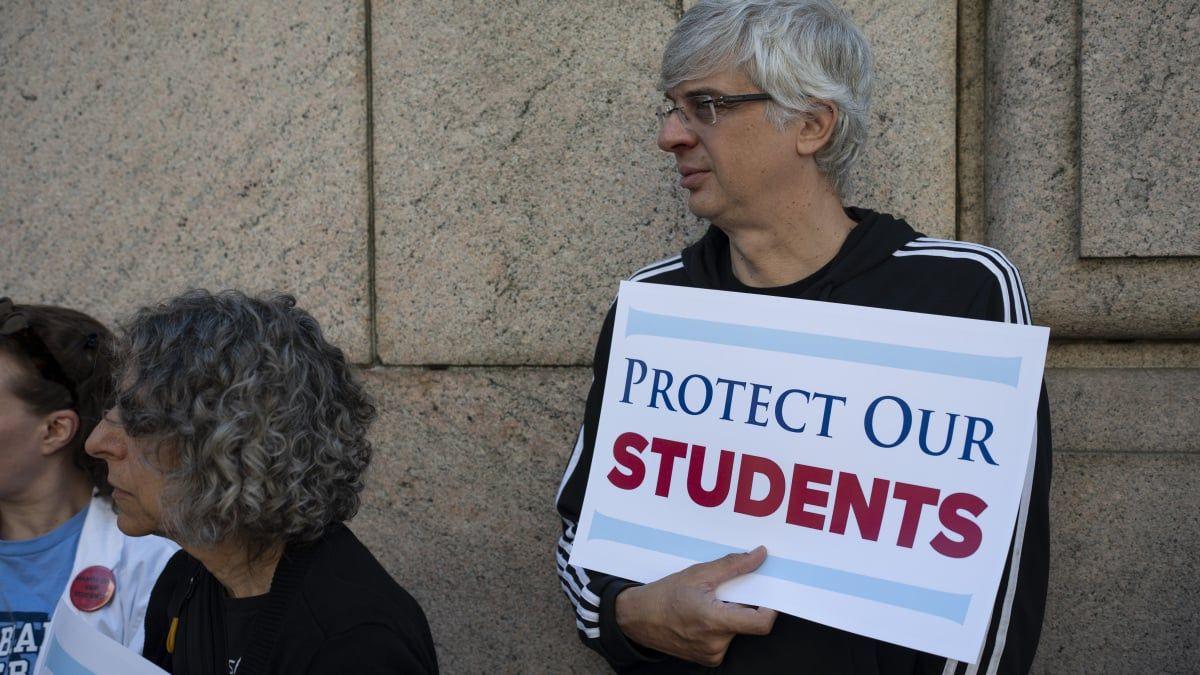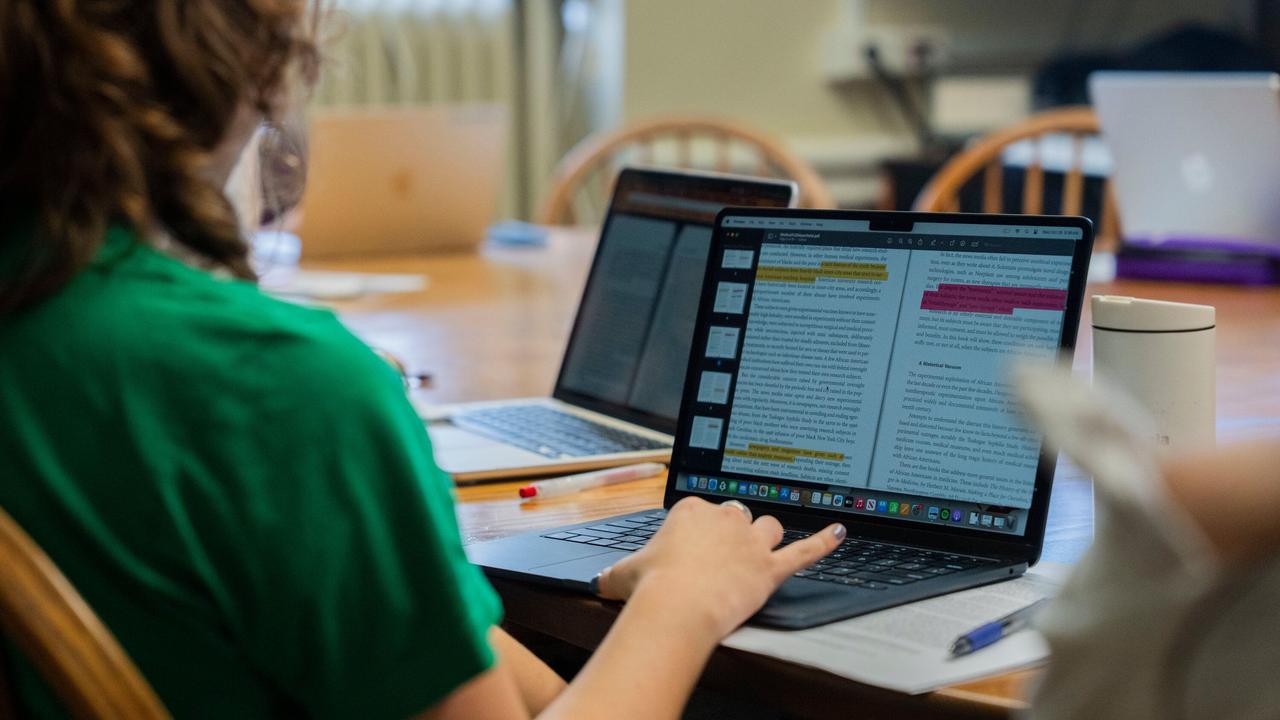Columbia University Tests AI-Powered Debate Tool Amid Campus Tensions
2 Sources
2 Sources
[1]
Columbia tries using AI to cool off student tensions
Can AI help "smooth over" discussion on abortion, racism, immigration, or Israel-Palestine? Columbia University sure hopes so. The Verge has learned that the university recently began testing Sway, an AI debate program currently in beta. Developed by two researchers at Carnegie Mellon University, Sway matches up students with opposing views to chat one-on-one about hot-button issues and "facilitates better discussions between them," according to the tool's website. Nicholas DiBella, a postdoctoral scholar at CMU who helped develop Sway, told The Verge that about 3,000 students from more than 30 colleges and universities have used the tool. One of those may soon be Columbia. News of the potential partnership comes after more than two years of escalating tensions at Columbia between students, administrators, and the federal government. The university has spent years at the center of controversy after controversy: expulsions of pro-Palestinian student protesters, a string of police raids, and demands from the federal government. People at Columbia's Teachers College are testing Sway in order to potentially integrate it into the conflict resolution curriculum and "bridge-building initiatives at Columbia," DiBella said. He said there's also been interest from other teams at Columbia in using Sway for the fall 2026 semester and onward. Simon Cullen, an assistant professor at CMU and the other developer behind Sway, told The Verge that the company is also in touch with Columbia University Life. Sway places an "AI Guide" in every chat that "asks tough questions to improve student reasoning." The tool also "suggests a rephrasing" for language it deems disrespectful. One example debate topic laid out in Sway's intro video: whether or not the US "should prioritize Palestinian rights and stop sending weapons to Israel." Columbia did not provide a comment by publication time, even after being granted a request for more time to respond. Columbia is making sweeping changes as part of a $200 million settlement with the Trump administration that's ostensibly meant to combat antisemitism on campus -- a settlement that restores Columbia's access to up to $1.3 billion in federal funding. The school has to provide staggering amounts of data to the Trump administration, enforce "strict rules against disruptive protests," and "strengthen oversight of international students." And on top of that, Columbia said it would commit to work with organizations to "to create constructive dialogue" on campus. It's likely that the potential partnership with Sway AI falls under that category for Columbia. It's one instance of many when it comes to the university throwing money at student disagreements in an attempt to solve problems without friction, according to Columbia sources who spoke with The Verge. "This is a pattern that Columbia repeats, where our conversations are evacuated of politics and history and context," the Columbia source, who requested anonymity for fear of retaliation, told The Verge. They added: "Columbia, as a place of scholarship and study, excels at framing the nuance and politics of these issues. What the administration is trying to do is frame these as 'difficult conversations,' evacuated of their rooted context, both at the university and globally." One place for such conversations is a group called Student Leadership Engagement Initiative (SLEI), billed as a way to facilitate dialogue between students and senior administrators, which had seven meetings last fall and seven last spring. It involves more than 70 students that are hand-picked by deans of students (and paid thousands of dollars each, per the Columbia source) to come together and "explore differences in points of view," according to the website. "It's pretty much the trustees trying to put out fires in my opinion," the Columbia source said, adding, "[Otherwise], you would never see trustees drop that much money per student to come to meetings to meet with senior administrators ... It just seems like they were trying to throw money at it." "One of the constants of the last two years at universities like mine has been a crisis response-style approach to political controversy, dissent, and protest," Joseph Howley, associate professor in Columbia's Classics department, told The Verge. "What we have are approaches from the world of corporate crisis response, policing, and law enforcement being directed at disagreement and dissent as if they are problems to be solved rather than fundamental values to be cherished." Sway's Cullen has said publicly that the tool is tied to the US intelligence community when it comes to part of its funding and research. Sway also received recent funding from the Arthur Vining Davis Foundations, the Snyder Foundation, the Omidyar Network, the Tools Competition, and Carnegie Mellon University itself, DiBella said. DiBella said that Sway will share anonymized data with the public and the intelligence community, but not transcripts or specifics. "All the data that we share is public, so there's not any specific data-sharing pipeline with the intelligence community," he said. The reason for the intelligence community's involvement is that they fund DiBella's own postdoctoral work, he said. They "have a bunch of these postdocs that they fund each year to carry out basic scientific research that might be of interest to the intelligence community," DiBella said. "They fund basic research that could be of interest to them, but it's entirely unclassified, unconfidential research and there's no specific data that's shared with them." He also said that though the company does not share student transcripts nor answers with instructors, it does share with them each student's score on a five-question "understanding quiz" they take after participating in a discussion, which gauges how well they understood the logic of the discussion. When asked about Sway, the Columbia source said, "I don't trust Sway would approach this with any understanding of international politics, of power, and it would just be about making people feel better. That really frustrates me, as it's a common move at Columbia." In Sway's early empirical studies, the team tested users on the topic of whether the 2020 election was "stolen." But debates like this spur the question: Is it really productive for dialogue, in cases where one side is proven to be wrong, to merge closer together or to "sway" one person closer to a view based on misinformation? In which cases is moderation between two opinions decidedly not good -- and who decides that? Sway's "understanding quiz" measures success based on a rotation of survey questions given to students in groups of about five questions. They include whether the student found the discussion valuable, whether they now had a better opinion of someone on the opposing side, whether they think the arguments presented by the other side are better than they did before the discussion, and, crucially, whether the discussion caused them to change their mind about the topic of discussion. "Close to 50 percent actually say they changed their mind about something in the discussion," DiBella told The Verge. Though he said that alone isn't a measure of success because "it might be that they changed their mind in the direction of falsity rather than the direction of truth." Ultimately, he said the Sway team isn't trying to get students to change their opinions but is looking to get them to be open to arguments from the other side, with less hate involved. "After having these discussions, students do become less confident in their own views," he said, adding, "They're getting closer to each other. They're becoming more malleable. That's actually why we used the word 'sway' ... We want their opinions to be more malleable to allow for the capability of changing your mind." The potential Sway partnership is not the only way Columbia is reportedly using tech to screen or shape students' convictions. The university is also reportedly using Schoolhouse Dialogues, a tool offered by Sal Khan of Khan Academy's nonprofit, to pair high school students with opposite viewpoints on controversial topics, then rank each other's "civility" -- and Columbia could use that feedback in its admissions decisions. To Howley, who has also taught a course on AI labor and knowledge work, there's an influx of groupthink about "the magical promise of AI" that university leadership isn't immune to. "Some of the people at the very top, who ... do not do the work of knowledge, creation, or education, have convinced themselves that this kind of software is a magic bullet, and we are in a political moment where everyone is looking for magic bullets," he said. "It all just couldn't be more disconnected from what I think of as -- sorry to sound hyperbolic -- the sacred charge of a university."
[2]
Universities like Columbia are turning to AI chatbots to 'sway' student conflict
Columbia faculty have been pushing back against encroachments from the Trump administration. Credit: Mostafa Bassim / Anadolu via Getty Images College administrators think AI might be the solution to their political PR problems, as the Department of Education weaponizes long-standing civil rights law to control educational institutions under new Trump administration goals and university campuses crack down on student protest. New York City's Columbia University, for example, is reportedly exploring a student debate platform, powered by AI, that encourages more "civil" conversations about "dangerous" topics, including abortion, immigration, trans identities, and the humanitarian crisis in Palestine, according to an exclusive from The Verge. The embattled institution has been testing the tool at Columbia's Teachers College under new conflict resolution curriculum. The tool in question is called Sway, a beta program designed by Carnegie Mellon University postdoctoral researcher Nicholas DiBella. DiBella has tested the tool on 3,000 students from more than 30 colleges and universities, including debates on contentious topics like whether or not the 2020 election was legitimate. As an intended moderator between students with polar viewpoints, Sway encourages individuals to find a middle ground and for students to rephrase verbiage that may be "disrespectful." DiBella says that students often come away "less confident in their own views," but closer to their colleagues. DiBella has received partial funding from the U.S. intelligence community to construct Sway as part of his doctoral work, and has said that it will "share anonymized data with the public and the intelligence community, but not transcripts or specifics." Columbia associate professor Joseph Howley told The Verge that Columbia is failing to appropriately handle student tension, with Sway providing yet another example. "What we have are approaches from the world of corporate crisis response, policing, and law enforcement being directed at disagreement and dissent as if they are problems to be solved rather than fundamental values to be cherished," said Howley. Sway isn't the first tool Columbia has used to assuage student tension (or, allegedly, filter out student dissent). The university reportedly uses Khan Academy's Schoolhouse Dialogues system to pair prospective students in debate-style conversations, which are then ranked by "civility" and fed back to Columbia admissions officers. In 2024, the university came under fire for its militarized treatment of student protesters who had bunkered down on university grounds to demand the school divest from its Israeli ties. Earlier this year, Columbia complied with immigration officials to arrest international students under pressure from President Trump, allowing and later disciplining student protesters with suspensions, degree revocations, and expulsions. Columbia settled with the federal government for $200 million in July, complying with demands to hand over student data in order to monitor protests and international students and foster "constructive dialogue."
Share
Share
Copy Link
Columbia University explores using Sway, an AI-powered debate platform, to address student conflicts over contentious issues like the Israel-Palestine situation, as part of a broader strategy to manage campus tensions.
Columbia University Explores AI-Powered Debate Tool
Columbia University is testing an AI-powered debate program called Sway to address escalating student tensions on campus. Developed by researchers at Carnegie Mellon University, Sway aims to facilitate better discussions between students with opposing views on controversial topics
1
.How Sway Works

Source: The Verge
Sway matches students with opposing viewpoints for one-on-one chats about contentious issues. The platform employs an "AI Guide" that asks challenging questions to improve student reasoning and suggests rephrasing for language deemed disrespectful. Topics covered include abortion, racism, immigration, and the Israel-Palestine conflict
1
.Columbia's Interest in Sway
Columbia's Teachers College is exploring the integration of Sway into its conflict resolution curriculum and bridge-building initiatives. The university's interest in the tool comes amid ongoing controversies, including expulsions of pro-Palestinian student protesters and federal government demands
1
.Broader Context of Campus Tensions

Source: Mashable
The potential partnership with Sway is part of Columbia's efforts to address campus conflicts following a $200 million settlement with the Trump administration. This settlement, which restores Columbia's access to federal funding, requires the university to enforce strict rules against disruptive protests and strengthen oversight of international students
1
.Concerns and Criticisms
Some faculty members and students have expressed concerns about the university's approach to managing dissent. Critics argue that using AI tools like Sway may oversimplify complex issues and remove them from their historical and political context
1
2
.Related Stories
AI in University Admissions
Columbia has previously used AI tools in its admissions process. The university reportedly employs Khan Academy's Schoolhouse Dialogues system to pair prospective students for debate-style conversations, which are then ranked by "civility" and considered by admissions officers
2
.Intelligence Community Involvement
Sway's development has ties to the US intelligence community, raising questions about data sharing and privacy. While the tool's creators assert that only anonymized data will be shared publicly, the connection has sparked concerns among some observers
1
2
.Broader Implications for Higher Education
The use of AI tools like Sway to manage campus conflicts reflects a growing trend in higher education. As universities face pressure from government agencies and struggle to balance free speech with campus safety, the role of AI in shaping student discourse and managing dissent is likely to remain a contentious issue
2
.References
Summarized by
Navi
[1]
Related Stories
Student Demands Tuition Refund After Catching Professor Using ChatGPT
15 May 2025•Technology

Professors develop custom AI teaching assistants to reshape how universities approach generative AI
18 Jan 2026•Technology

AI in Education: Reshaping Learning and Challenging Academic Integrity
12 Sept 2025•Technology

Recent Highlights
1
ByteDance's Seedance 2.0 AI video generator triggers copyright infringement battle with Hollywood
Policy and Regulation

2
Demis Hassabis predicts AGI in 5-8 years, sees new golden era transforming medicine and science
Technology

3
Nvidia and Meta forge massive chip deal as computing power demands reshape AI infrastructure
Technology





